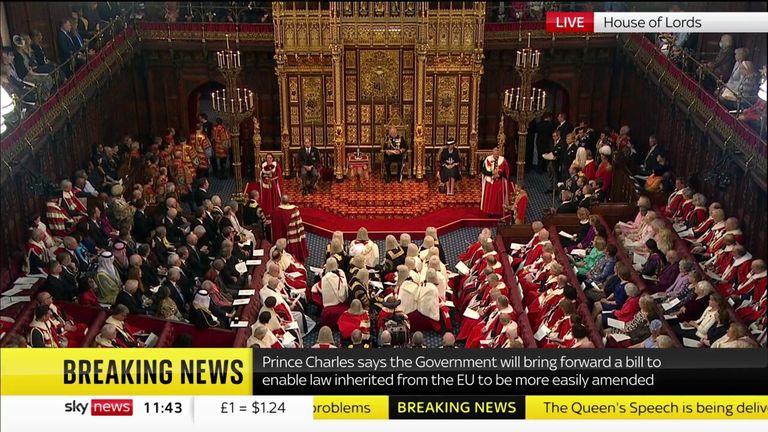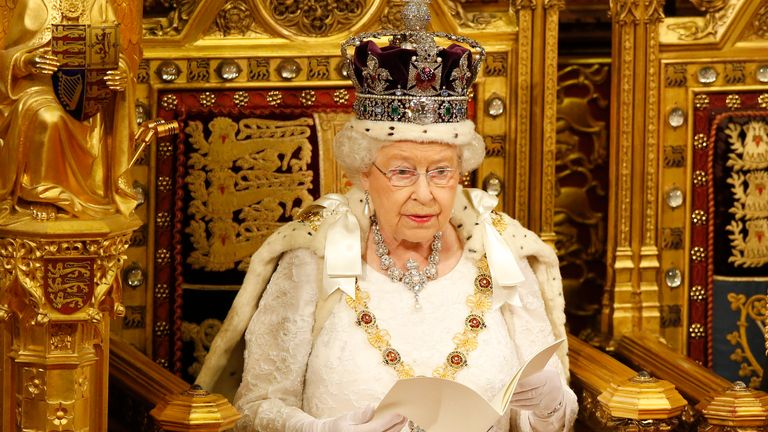Boris Johnson has promised to “grow and strengthen the economy and help ease the cost of living for families” through new measures in the Queen’s Speech.
The address, which outlines the government’s legislative agenda for the year ahead, focused heavily on the economy as the PM aims to get the country “back on track” after the COVID pandemic while simultaneously addressing growing cost of living challenges.
But Mr Johnson warned the government cannot “completely shield” people from spiralling costs with inflation set to hit a 40-year high later in 2022 – and no immediate extra help for households was announced.
The government highlighted the £22 billion package of help with energy bills, tax cuts and other measures already announced and hinted at further support in future.
The speech was read by the Prince of Wales as the monarch missed the state opening of Parliament for the first time in almost 60 years as she continues to experience “episodic mobility problems”.
The Queen, 96, is understood to have watched proceedings on television from Windsor Castle.
Politics hub – follow the Queen’s Speech debate live
The Prince of Wales said the government’s priority is to “grow and strengthen the economy and help ease the cost of living for families”.
“My government will level up opportunity in all parts of the country and support more people into work,” he said.
In a tweet ahead of the state opening, the PM said his government is “focused like a laser” on the issues that matter most to the public.
But Labour have repeatedly said the government is not doing enough to help ease household pressures as bills continue to soar.
In all, the speech contained 38 bills, including seven measures scrapping EU regulation, as ministers seek to capitalise on the benefits of Brexit.
These include:
• a British Bill of Rights – to replace the Human Rights Act
• Brexit freedom bills, repealing hundreds of pieces of EU legislation still in UK law
• a Schools Bill for England – to crack down on truancy, reform the funding system and increase the powers of education watchdogs
• a Media Bill, allowing the controversial privatisation of Channel 4
• a Levelling Up and Regeneration Bill – giving local leaders powers to rejuvenate high streets
• a Public Order Bill – preventing so-called highly disruptive tactics used by protest groups
• a draft Mental Health Bill – which will overhaul existing powers
• an Energy Bill – pledging to building up to eight new nuclear power stations to increase wind power and solar energy.
• a Transport Bill – to “simplify the railways” and ensure a better and more reliable service for passengers
Elsewhere in the speech was a pledge to reform the planning system “to give residents more involvement in local development” and to bring forward proposals “to establish an independent regulator of English football”.
The Prince of Wales said the government “will play a leading role in defending democracy and freedom across the world” amid the war in Ukraine and take action to prevent “dangerous and illegal Channel crossings” and tackle the criminal gangs who profit from the journeys.
He continued: “Her Majesty’s ministers will continue to seize the opportunities of the United Kingdom’s departure from the European Union, to support economic growth. Regulations on businesses will be repealed and reformed.”
Measures to improve the regulation of social housing and a ban on conversion therapy were also referenced.
The conversion therapy Bill will aim to stop “abhorrent practices which do not work and cause extensive harm” and protect people’s freedom to love who they want, the government said.
Things which did not feature in the speech include a bill which would have created a single agency to enforce employee rights and made flexible working the default option for staff.
The Queen pulled out of the ceremonial occasion with a statement from Buckingham Palace on Monday saying she had “reluctantly” decided not attend this year following advice from the royal doctors.
The Duke of Cambridge was also in attendance at the state opening for the first time, jointly opening the new session of Parliament on the Queen’s behalf as Counsellors of State with his father.
Before now, the Queen has only missed the opening of Parliament twice during her time on the throne – in 1959 and 1963 when she was pregnant.
The speech itself lasted nine minutes and MPs in the Commons will debate its contents this afternoon.


